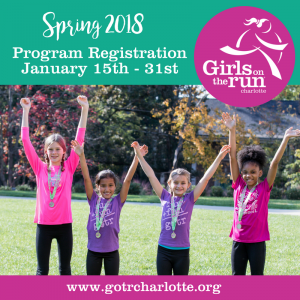By Allison Riley, PhD, Girls on the Run International
One of my two-year-old daughter’s favorite activities is playing with blocks. She enjoys exploring their shape and texture as well as sorting them by color and size. Her ultimate fun is tower building. Since her ability to stack began to bud, she’s spent countless hours stacking and stacking, working her hardest to build an even taller tower. As she stacks blocks on top of one another, I can see the range of emotions crossing her face and, when each tower ultimately comes crashing down, these feelings, particularly frustration, are often magnified. 
As I sit on the floor alongside my daughter and observe her structural pursuits, I recognize her effort and remind her of her personal improvement. “You could stack 5 blocks last week and now you can stack 10 blocks. Wow!” Each time her tower falls I encourage her to keep trying and, occasionally, I show her different ways to stack the blocks.
What I am attempting to do, even at this young age, is to create a mastery motivational climate. Perhaps you haven’t heard this specific term before, but the underlying concept is likely a familiar one. In a mastery climate, the emphasis is placed on personal improvement and effort, and mistakes are seen as learning opportunities.
A performance climate, the opposite of a mastery climate, focuses on competition and favorable comparison to others. In the example above, I would instead make the tallest tower I could and define success for my daughter by comparing the height of her tower to the height of mine. Instead of focusing on her growing skill, I would turn tower-building into a lopsided competition. Hopefully we can agree that this approach would not be effective (or pleasant) with my toddler. Why, then, is it so common in youth sports?
As a parent, caretaker or coach, here’s what you can do to create a mastery climate for the kids in your life:
1. Reflect on your own experience in sport and physical activity as a kid. Gaining an awareness of how your own experiences might influence the environment you’re creating for your kids is a critical first step. After you reflect on your experience and the feelings that those experiences evoked, commit to doing things differently if needed. Just because you were constantly compared to others doesn’t mean it has to be that way for your kids.
2. Recognize effort and personal improvement. In many youth physical activity contexts, only the best athletes are praised and encouraged (performance climate). If we want all kids to have a good experience with physical activity, this is not the most effective approach. When you talk to your kid after a game, instead of asking if they won or who scored the most goals, ask them how they think they improved and if they tried their best.
3. Provide opportunities to practice skills. In a mastery climate, the focus is on learning, so it’s important that kids have a chance to practice their newly developed skills. As a parent, you can help your kids grow by taking some time to work individually with them outside of the practice or game setting.
4. Allow, and even encourage, mistakes. Most people would probably say that making mistakes is okay but, in my experience, that belief doesn’t always translate to their actions or how they speak to their child. When kids feel like they can’t make mistakes they’re more likely to sit out new challenges for fear of failure or to experience so much anxiety that the activity is no longer enjoyable. Instead of highlighting mistakes as something bad, view them and use them as learning opportunities.
5. Teach goal setting and provide a structure for tracking goals. Encourage your child to set specific, optimally challenging goals. Tracking progress over time allows them to see how they are learning and improving. At Girls on the Run, participants keep track of their personal goals and progress on a goal sheet. Fitness trackers can also be helpful tools as long as the focus is on personal improvement (“I walked 0.5 miles more today than yesterday”) instead of comparison to others (“I walked 1 more mile than my sister today”).
Even though I know through experience and research that I should create a mastery climate for the kids I work with, I still revert back to a performance climate on occasion. You probably won’t catch me celebrating because I built a taller tower than my toddler, but put me on a soccer field and it might be a different story. When I find myself focusing on competition and making comparisons to others, I take a step back, review my goals and celebrate my improvements over time. I encourage you to do the same.
Spring 2018 Registration for Girls on the Run and Heart & Sole
Spring 2018 program registration for Girls on the Run (3rd-5th grade) and Heart & Sole (6th-8th grade) opens Monday, January 15th and the 10-week program season begins the week of February 12th.
Learn more about the Girls on the Run and Hearth & Sole programs and view a list of spring program sites and practice schedules by clicking here.
About the Author: Dr. Allison Riley is the Vice President of Programming and Evaluation at Girls on the Run International. Her expertise is in physical activity-based positive youth development programs.


